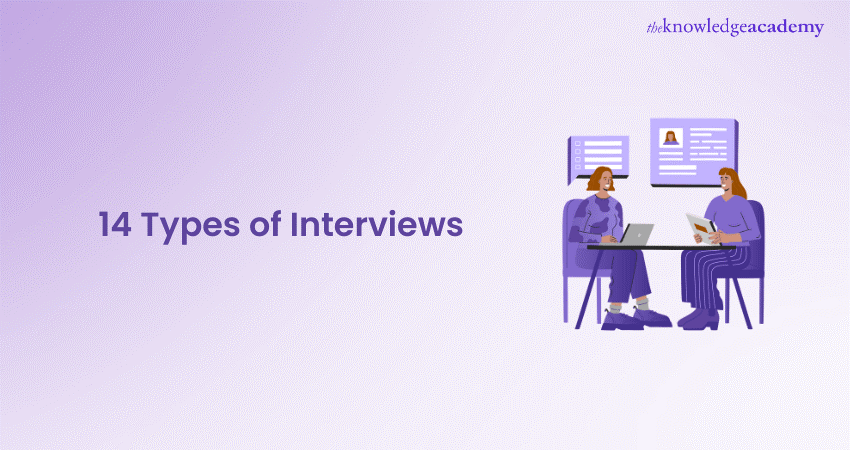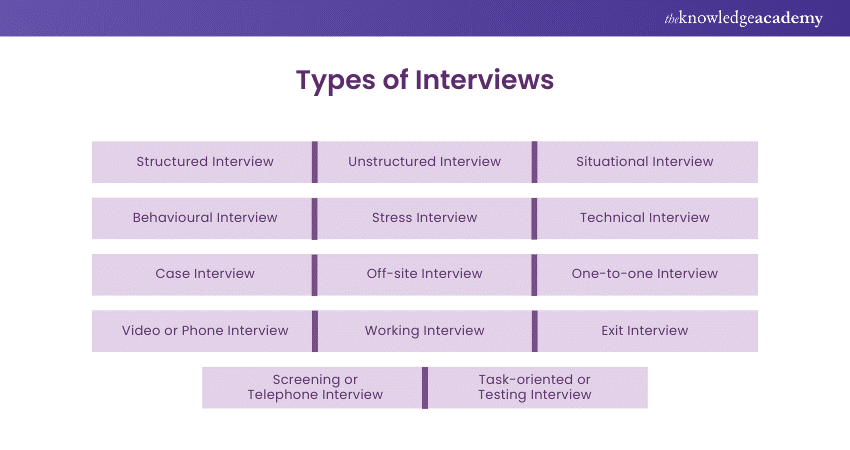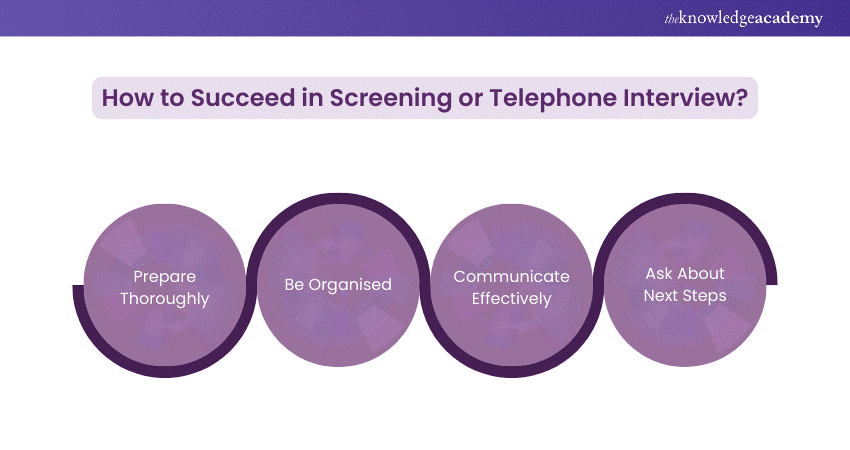We may not have the course you’re looking for. If you enquire or give us a call on +44 1344 203 999 and speak to our training experts, we may still be able to help with your training requirements.
Training Outcomes Within Your Budget!
We ensure quality, budget-alignment, and timely delivery by our expert instructors.

Ever wondered how companies go beyond the usual questions to evaluate candidates? Discovering the 14 Types of Interviews can give you an edge in any situation. Each type serves a unique purpose, from testing your problem-solving skills to seeing how you handle stress.
By familiarising yourself with these interview types, you can set yourself up for success. Whether it’s a structured, unstructured, or Situational Interview, knowing what to expect will boost your confidence. So, dive in and explore the 14 Types of Interviews to enhance your chances of landing that dream job!
Table of Contents
1) What is an Interview?
2) Types of Interviews
a) Structured Interview
b) UnStructured Interview
c) Situational Interviews
d) Behavioural Interviews
e) Stress Interviews
f) Technical Interviews
g) Case Interview
h) Off-site Interview
i) One-to-one Interviews
j) Video or Phone Interviews
3) Types of Interview Formats
4) Conclusion
What is an Interview?
An interview is a vital conversation between a potential employer and a candidate, designed to help the candidate secure their dream job. It evaluates whether the candidate has the necessary skills, personality traits, and industry knowledge. This discussion helps employers identify and select the most suitable candidate to fill the vacant position in their company.
Key points to consider:
a) Assessment of Skills: Employers check if the candidate has the relevant skills for the job.
b) Personality and Traits: The interview gauges the candidate’s personality and character traits.
c) Industry Knowledge: Employers assess the candidate’s understanding of the industry.
d) Information Gathering: Employers ask questions to gather detailed information about the candidate.
e) Candidate Inquiries: Candidates can ask about job responsibilities and salary expectations.
f) Verification: Interviews serve to verify the claims made in the candidate’s application.
Types of Interviews
There are different Types of Interview methods. Let’s discuss some of them below.

Structured Interview
A method where employers ask all candidates the same fixed set of questions.
a) Fixed set of questions for all candidates.
b) Responses recorded and graded against a scoring system.
c) Eliminates bias in the recruitment process.
Unstructured Interview
An interview style where questions evolve based on the candidate’s responses.
a) Questions evolve based on candidate’s responses.
b) No fixed format; questions can vary widely.
c) Interviewer adapts questions as the interview progresses.
Situational Interview
Employers present candidates with hypothetical problems to evaluate their problem-solving approaches.
a) Candidates presented with hypothetical problems.
b) Evaluates problem-solving approaches.
c) Candidates draw on similar past situations.
Behavioural Interview
Focuses on assessing a candidate’s past behaviour in different situations.
a) Focuses on assessing past behaviour in different situations.
b) Predicts future performance based on past experiences.
c) Open-ended questions compared against a rating scale.
Stress Interview
Evaluates how candidates handle pressure in various workplace scenarios.
a) Evaluates how candidates handle pressure.
b) Common in fields like consulting.
c) Deliberately creates stressful scenarios.
Technical Interview
Designed to assess a candidate’s technical knowledge and job-specific skills.
a) Assesses technical knowledge and job-specific skills.
b) Prevalent in industries like IT, healthcare, engineering, and science.
c) Determines if candidates have the necessary expertise.
Case Interview
Candidates are presented with a scenario to solve, evaluating their problem-solving abilities.
a) Candidates presented with a scenario to solve.
b) Evaluates problem-solving abilities.
c) Scenarios can be hypothetical or real-life.
Off-site Interview
Informal interviews that take place outside the office, often in a casual setting.
a) Informal setting, often over lunch or in a casual environment.
b) Assesses personality in a relaxed context.
One-to-one Interview
A common format where a single interviewer engages with a candidate.
a) Single interviewer engages with the candidate.
b) Mix of general, technical, situational, and behavioural questions.
c) Candidate has the opportunity to ask questions.
Video or Phone Interview
Conducted when in-person meetings are not feasible, often used for initial screening.
a) Conducted when in-person meetings are not feasible.
b) Used to screen potential candidates before face-to-face interviews.
c) Spontaneous responses provide insights into intelligence and interpersonal skills.
Elevate your skills and transform your life with our Personal Development Courses – Start your journey to growth and success today!
Working Interview
A job seeker is given a task to complete, allowing them to showcase their practical skills.
a) Job seeker completes a task during the interview.
b) Employer assesses actual performance.
c) Candidate showcases practical skills over theoretical knowledge.
d) Provides hands-on experience of the job’s roles and responsibilities.
Exit Interview
Conducted when an employee is leaving the company to gather feedback on their work experience.
a) Conducted when an employee is leaving the company.
b) Provides insights into why the employee is departing.
c) Employers gather feedback on the employee’s work experience.
d) Helps identify areas for improvement within the company’s workflow.
Screening or Telephone Interview
Phone interviews are a cost-effective method for screening candidates. This usually lasts between 10 to 30 minutes. Here are some tips to help you succeed in a Telephonic Interview:

1) Prepare Thoroughly: Treat the interview like an open book exam. Have your CV, job description, list of references, and prepared answers in front of you.
2) Be Organised: Keep all necessary documents within reach to ensure you can reference them quickly.
3) Communicate Effectively: Since the interviewer can’t see your body language, it’s crucial to deliver positive and concise answers with enthusiasm.
4) Ask About Next Steps: Always inquire about the next steps in the hiring process before the call ends.
Following these steps will make a strong impression and enhance your chances of moving ahead in the hiring process.
Task-oriented or Testing Interview
These interviews are designed to showcase your creative and analytical problem-solving skills through various tasks or exercises. They may include a short test to evaluate your technical knowledge and skills. Additionally, a presentation to a group might be required to assess your communication skills. Staying relaxed is essential!
Maximise Efficiency and Focus with our Expert Attention Management Training – Register today!
Types of Interview Formats
When preparing for an interview, researching different formats can enhance your readiness. Here are various interview formats:
1) Individual
This format involves one interviewer and one candidate. Employers may ask situational or behavioural questions, job-specific questions to gauge fit, and general questions about experience, background, strengths, and qualifications. Highlight your relevant skills and solve problems for the company, using examples from past experiences.
2) Group
Multiple applicants are interviewed simultaneously. The interviewer may provide a discussion topic and an observer rate performance. This format helps employers understand candidates’ interpersonal and communication skills and how they apply their strengths and qualifications in group settings.
3) Panel
Several interviewers assess a single candidate on skills, qualifications, and experience. The panel typically includes a hiring manager, a colleague, or a team manager. Interviewers ask questions in succession, allowing the panel to evaluate how well the candidate fits the company’s values and culture. Maintain eye contact with everyone and share your successes.
4) Multiple round
Common for technical roles, this format includes several interview rounds. Initial rounds may focus on technical skills, while the final round often involves a hiring manager discussing the role and salary expectations. Success requires strong communication and interpersonal skills to highlight your abilities.
5) Informational
Candidates interact with professionals from the company they are interested in. These interviews help understand the company’s work culture and environment. Professionals answer questions about job roles and potential growth. Prepare a list of questions about the company and its culture.
6) Computer-assisted
Often video interviews, where employers provide questions on-screen. This method speeds up hiring but may not assess emotional intelligence, communication, or interpersonal skills effectively. It’s useful for screening a large number of candidates.
Listen, Understand, and Respond Effectively – Start Active Listening Training Now!
Conclusion
Mastering the 14 Types of Interviews can significantly boost your confidence and performance during the hiring process. Each interview type offers a unique way for employers to gauge your skills, personality, and fit for the role. By understanding and preparing for these different formats, you’ll be well-equipped to handle any interview scenario that comes your way.
Sharpen Your Interview Skills with our Interview Skills Training and Land Your Dream Job with Confidence!







 Top Rated Course
Top Rated Course



 If you wish to make any changes to your course, please
If you wish to make any changes to your course, please


